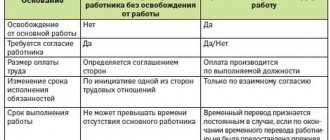Who is a social educator
A social teacher is a specialist whose main area of work is organizing and conducting a set of activities for the upbringing, education, development and social protection of the individual in an educational institution.
What is the responsibility of a social teacher is determined by the qualification requirements for this specialist, which are approved by Order of the Ministry of Health and Social Development dated August 26, 2010 No. 761n. In accordance with the order, this position is filled by people with higher or secondary vocational education in the field of “Education and Pedagogy” or “Social Pedagogy”. There are no work experience requirements. A social teacher registers difficult students and works with them individually, thereby creating a psychologically comfortable environment at school for the successful work of teachers and the learning of schoolchildren. The responsibilities of a social teacher at school are:
- discussing current events of our time with students;
- participation and interaction with teachers, parents;
- assistance to students;
- preparing and holding parent meetings;
- ensuring the protection of life and health of students, etc.
https://youtu.be/8uERw9Oos-k
Professional standards in social work
Professional standards for social work: place and role in the social sphere. Makina A. I., Chmykh K. V. Khakass State University named after N. F. Katanov, Abakan, Russia
Abstract: This article discusses the problem of introducing professional standards, namely professional standards for social work and their place and role in the social sphere. The introduction of professional standards for social work is due to the need to improve the social policy of the state and has its own regulatory basis - the Decree of the President of the Russian Federation and the Resolution of the Government of the Russian Federation.
Key words: standardization, standard, professional standard, social work.
At this stage of Russia's development, there are many social problems, including those related to the labor market. First of all, these include the inability of many citizens to realize their professional knowledge, to find a job that would allow them to have a decent salary, develop, and build a career.
In addition, the need to study professional standards in social work is due to several reasons:
firstly, the lack of a uniform standard of education, which is why holders of diplomas from different institutions have completely different levels of experience and knowledge;
secondly, the increasing need for highly qualified social work specialists, as the population’s demand for qualified social assistance increases;
thirdly, now, according to the Labor Code, the employer has the right to certify a person for his competence, but then he must independently describe what this is. This can be difficult for an institution that does not have sufficient experience, and legal disputes may arise. The emergence of a legislative framework and the definition of a professional standard will remove all contradictions and help avoid many legal proceedings;
fourthly, the issue of certification of professional qualifications (including specialists in the field of social services for the population), which is impossible without relying on professional standards, is currently very acute. This event will be held on the basis of existing professional standards for social work.
In this regard, it is advisable to study the place and role of professional standards for social work in the social sphere, through comparison, analysis of scientific literature, periodicals, regulatory legal documents of the Government of the Russian Federation and the Ministry of Labor and Social Protection.
Before moving on to the analysis of the concept of professional standard, it is necessary to study the concept of standardization and standards in general. In our world, the standardization of products, services, and business processes has long become comprehensive. We encounter standards everywhere - both at work and in life.
In Russia, in the reference book on social work by M.A. Gulina, a standard, in the broad sense of the word, is usually understood as a sample, a standard, a model, taken as the original for comparing other similar objects with them [2]. The generally accepted definition of the concept of a standard is taken from a document of the International Organization for Standardization. According to this document, a standard is a technical standard or other document that is accessible and published, collectively developed or agreed upon and generally accepted for the benefit of those who use it, based on the integration of the results of science, technology, experience, contributing to the improvement of the public good and adopted by organizations authorized to national, regional and international levels.
Thanks to the standards, a high level of quality of products and services is ensured, the efficiency of the production activities of organizations and their interactions, the possibility of exchanging information in global computer networks, the formation of a global labor market and educational services, etc.
An important trend in the modern standardization process is the acceleration of the pace of standardization of various types of human activities, as well as the integration and harmonization of all standards into a unified system of information society standards. Such standards define the fundamental qualities of professionals in this field, as well as various requirements for their activities.
In Russian regulatory documents and scientific literature there are several definitions of the concept of professional standard. Professional standard (occupational standard) - a detailed description of the requirements for the basic functions performed by employees [3, p. 7–9 ]. A professional standard is a normative document intended to determine the job responsibilities of employees, plan their professional growth, organize professional training and advanced training in accordance with the development of requirements for the quality and productivity of services, selection, placement and use of personnel, as well as justification of decisions made during certification of managers and specialists.
For an employer, a professional standard is the basis for selecting quality personnel on the labor market, since it serves:
- the basis for determining evaluation criteria in the selection and selection of personnel; ensuring the quality of personnel work;
- ensuring professional growth of personnel; maintaining and improving quality standards in the organization through monitoring and improving the professionalism of its employees;
- increasing staff motivation in your organization;
- increasing efficiency, ensuring stability and quality of labor, and consequently, high economic results.
The professional standard is also necessary for social service workers, since for them it is the basis for:
- determining one’s own professional level and areas of professional training and improvement;
- effective functioning in the institution;
- ensuring your own demand in the labor market, reducing the time required to find a suitable job;
- career growth and increased income.
Professional standards are also necessary for the education sector as the basis for the formation of federal educational standards and educational programs at all levels of vocational education, the development of teaching materials and the choice of forms and methods of training in the system of vocational education and in-house personnel training.
Without professional standards there can be no effective educational standards; in the absence of professional standards, employers cannot really contribute to the development of effective and forward-looking educational standards. For educational authorities, professional standards create the opportunity to formulate real and measurable learning outcomes in the vocational education system, plan the volumes and profiles of training, and determine lifelong learning trajectories [5, p. 48 -49].
All the problems that were mentioned above raised the issue of introducing professional standards, especially in the field of social services. Taking into account existing foreign and some Russian experience, in order to solve the problems of ensuring the quality of the workforce and guarantees for social service workers, professional standards are gradually being introduced, which are, in essence, a description of qualification characteristics for specific professions.
Currently, the Ministry of Labor and Social Protection of Russia is actively interacting with business. An expert council was created to review draft professional standards, and they also approved the layout of the professional standard for a social work specialist. Active work on the development and implementation of professional standards in various fields is carried out by the Russian Union of Industrialists and Entrepreneurs. In the social sphere, the Association of Social Service Workers took the initiative to develop and implement professional standards.
Thus, the development and introduction of professional standards for social work in Russia will help solve important issues in the field of human resource management, such as:
- standardization of requirements for employees;
- achieving high results in social activities;
- selection of criteria for personnel selection;
- unification of requirements for the professional activities of social workers (in different regions, departments);
- developing employee motivation for self-improvement;
- development of training programs taking into account the requirements of the labor market;
- assessment of the quality of training in accordance with the requirements of employers (based on professional standards);
- effective management of state orders for the vocational education system (defining goals, planning volumes and profiles of training).
Links to sources
- Gorshkov M. A., Sheregi F. E. Youth of Russia: a sociological portrait. - M.: TsSPiM. - 2010. - P. 118.
- Gulina M.A. Handbook of social work, 2010. - [Electronic resource]. URL: https://www.psyoffice. ru /Dictionaries and encyclopedias.
- Privezentsev M.V., Oleinikova O.N. Professional standards as the basis for training competitive workers: Methodological manual. - M.: Alpha, 2007. - P. 7–9. 4.. Professional standards: international experience. - [Electronic resource]. URL: http://www. naloglib. Net /008/professionalnye-standarty-mezhdunarodnyi-opyt.
- Fonarev A. R. Psychological features of the personal development of a professional. - M., 2005. - p. 48–49. 9.
The article participates in the competition Best Youth Article of 2017
Professional standards in social work
Tell friends:
Tags: competitions for social workers
Job description of a teacher
The rights and responsibilities of a social teacher at school are outlined in the job description, which is developed on the basis of a qualification directory. The employer has the right to expand and increase the number of responsibilities compared to the handbook if he believes that this is justified. The structure of the job description is standard, consisting of four parts: general provisions and functions, duties, rights and responsibilities. It is important to mention that a specialist needs to know:
- directions of development of the educational system;
- laws and other regulations governing educational activities;
- Convention on the Rights of the Child;
- basics of social policy, etc.
Professional standard for a teacher
— 25% Discount on all courses for medical workers — — — June 15, 20205 MINThe transition to professional standards has been going on for several years.
During this time, innovations affected almost all areas of the economy - from heavy industry to personnel records management.
But with education it turned out that not everything was so simple: the development of professional standards for teaching staff was delayed, the implementation of already approved cases was repeatedly postponed. Therefore, today many teachers continue to work the old fashioned way, focusing on the methods used 15-20 years ago.
However, soon, according to the plan - by 2020, the transition period will end.
This means that all state and municipal educational institutions will have to apply professional standards in their work, as required by Decree of the Government of the Russian Federation No. 584 of June 27, 2016. It's time to understand the issue and understand what the professional standard of a teacher is, what new it promises to educators, and how to correctly apply qualification requirements in everyday teaching practice. Read the article: Selection of current professional standards:★ ★ ★ ★ ★ Professional standard is a specialized document, establishing requirements for education, qualifications and even personal qualities of an employee. It is also a convenient alternative to outdated tariff and qualification reference books, which are increasingly less applicable in modern realities every year. Attempts to develop a new qualification standard for teachers were made back in 2013, but the process almost immediately stalled for objective reasons.
In 2020, after long discussions and approvals, the general professional standard for teachers was finally approved (you can download it from the official website of Rostrud). Along the way, they also developed other professional standards for workers in the education sector. Today, the following professional standards are relevant: additional education teacher; educational psychologist; educator (educator, teacher); specialist
General provisions
In practice, persons who have the necessary education, preferably with work experience, who know the regulations of the Russian Federation in the field of education, who know the basics of psychology, and who have no criminal record, are appointed to the position of social teacher. A teacher must have certain personal qualities:
- love for children, goodwill;
- tolerance, responsibility;
- self-control, psychological stability;
- erudition, professionalism;
- communication skills, self-control.
Functions
In addition to the qualification directory, the legislator developed a professional standard, which was approved by Order of the Ministry of Labor and Social Protection dated January 10, 2017 No. 10n. The standard approves the main responsibilities of a social teacher:
- development of measures for pedagogical support of students in difficult life situations;
- planning activities to ensure positive socialization of students, etc.
Additionally, the job responsibilities of a school social teacher according to the Federal State Educational Standard are reduced to the following functions:
- planning and organizing measures for pedagogical support of students in the process of socialization;
- implementation of cultural and educational programs and activities to develop students’ social competence and positive social experience;
- organizational and methodological support of pedagogical support for students;
- development of self-government of students on the basis of social partnership, social institutions;
- organization of socially and personally significant activities of a group of students.
General labor function
A social worker must have vocational secondary education or general secondary education and professional training (internship) in the workplace. The employee is required to complete a special training course in first aid.
The professional standard does not have any special requirements for the practical experience of a social worker. However, only those persons who have no criminal record for crimes established by the legislation of the Russian Federation can be allowed to work.
The professional standard defines the main labor functions of a social worker:
- identification of persons who are in difficult life situations and need social security;
- purchasing food products with the client’s financial resources and delivering them to their home;
- assistance in preparing food from products available to the client;
- purchasing industrial goods from the list of essential items using the ward’s material resources and delivering them to their home;
- for clients living without central water supply or heating, a social worker delivers water and lights the stove;
- delivery of his personal belongings to a dry cleaner, laundry, workshop at the expense of the ward, delivery of repaired items to the client.
Responsibilities
The responsibilities of a social teacher in a school according to the Federal State Educational Standard are direct actions in accordance with federal state educational standards, which ensure the daily high-quality performance of the functions and tasks of the employee. Among the primary responsibilities of a teacher:
- analyzing student behavior and making predictions based on this research to avoid conflict situations;
- development of special adaptation programs for schoolchildren in order to improve the psychological situation at school;
- implementation of a set of activities for students in terms of personal education and individuality development;
- organizing events for schoolchildren and their parents to improve student safety;
- organizing consulting assistance for teachers during parent-teacher meetings, communicating with students’ parents, and conducting various school events;
- consultations with schoolchildren, parents and teachers on all issues related to adaptation and resolution of disputes in all conflict situations;
- mediation assistance in establishing communication between the child, family and school, if necessary.
Design rules
The job description can be developed as a corresponding annex to the employment contract or as a separate document. It is compiled for all employees of a specific position; it is irrational to use a personal assignment in such cases. The structure of the document includes several sections containing information in accordance with the professional standard.
General provisions of the instructions
The DI begins with the “General Provisions” section, which reflects the following information:
- job title in accordance with the organization’s staffing table;
- level of subordination in the organization;
- a list of required knowledge and skills that an employee must have;
- a list of regulations, the requirements of which must be observed when performing work duties.
Responsibilities
Important! The list of labor functions assigned to a specialist is reflected in the “Job Responsibilities” section.
It may include the following items:
- Identification of citizens in the supervised area who find themselves in difficult life situations and requiring social support, and maintaining their records.
- Establishing the reasons that led to the emergence of social problems among citizens and providing assistance for their resolution and social support.
- Organizing events to provide social support to citizens, taking into account each specific situation.
- Creating action plans to provide social assistance to citizens and monitoring their implementation.
- Consulting the population on various issues related to receiving help and protection from social services, including consultations on family and marriage issues, raising minor children.
- Providing mediation services between a citizen who has asked for help from the service and other specialists or institutions to provide him with social support and resolve the current situation.
- Participation in the creation of centers providing social services on issues of creating a family, adoption, registration of guardianship, rehabilitation.
- Other duties in accordance with established professional standards.
Rights
In addition to professional responsibilities, a social work specialist also receives a number of rights. Employees can:
- Require management to fulfill obligations to ensure optimal working conditions.
- Make suggestions aimed at improving the work process.
- Request assistance from management in fulfilling their job obligations, including providing information necessary to perform the job.
- Improve your qualifications by completing additional training.
- Other rights provided for by the labor legislation of the Russian Federation.
Rights
In addition to a long list of responsibilities, a social teacher has the rights that he has to perform the functions and tasks assigned to him by the Labor Code of the Russian Federation, the law on education, other regulations and the employer’s LNA. We are talking about the following rights and guarantees:
- to make independent decisions within the limits of their competence;
- obtaining guarantees and benefits in accordance with the legislation of the Russian Federation;
- for paid leave;
- to demand improved working conditions;
- for advanced training;
- to obtain information necessary to study the interests of students and conduct opinion polls.
Regulatory basis for the use of professional standards
Modern domestic legislation contains the following acts regulating the application of standards for professions:
- Federal Law No. 122-FZ, which introduced corresponding changes to the Labor Code of the Russian Federation and the Law on Education. For example, Article 195.3 was included in the Labor Code, which established the mandatory application of professional standards for positions for which special requirements are established by law.
- Article 57 of the Labor Code of the Russian Federation, indicating the need for professional standards for professions that have benefits, compensation or restrictions.
- Government Resolution No. 584, adopted on June 27, 2016. In accordance with it, organizations under state control must apply professional standards on a mandatory basis.
Based on these documents, we can say that professional standards are necessary:
- When the requirements for a position are specifically prescribed by law.
- If the organization is controlled by the state.
In other cases, in accordance with Part 2 of Art. 195.3 of the Labor Code, they are used as a basis for establishing qualification parameters for employees. And then they are used on a voluntary basis. For managers in the private sector, their use has the following benefits:
- Putting order in personnel documents - staffing schedules, work rules, job descriptions.
- Documenting the criteria on the basis of which the level of employees and candidates for positions will be assessed.
- Reducing the likelihood of conflicts during inspections of labor documentation by regulatory authorities.
Attention! Along with professional standards, the EKS and ETKS job classifiers continue to operate. If there are conflicts between their provisions, the employer himself has the right to choose the preferred option.
Responsibility
Responsibility for improper performance of one’s duties is provided for by the Labor Code of the Russian Federation. It doesn’t matter what the duties of a social teacher at school are, if he is systematically late for work, the administration has the right to take disciplinary measures against him, even if he performs his immediate duties in an exemplary manner. In addition to the Labor Code of the Russian Federation, the teacher is responsible for:
- use of violence, rudeness towards students;
- life and health of students in the process of education;
- causing harm to the school and property damage;
- inappropriate performance and failure to complete one's work;
- abuse of authority;
- compliance with safety and labor protection instructions;
- quick response in a force majeure situation and timely notification to the school principal.









